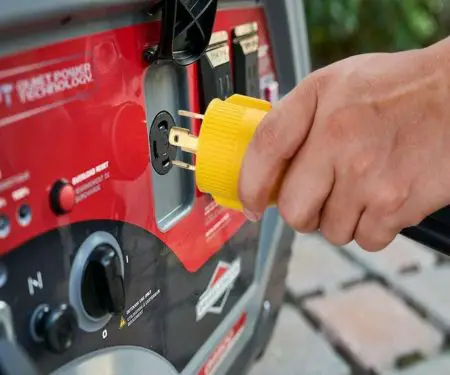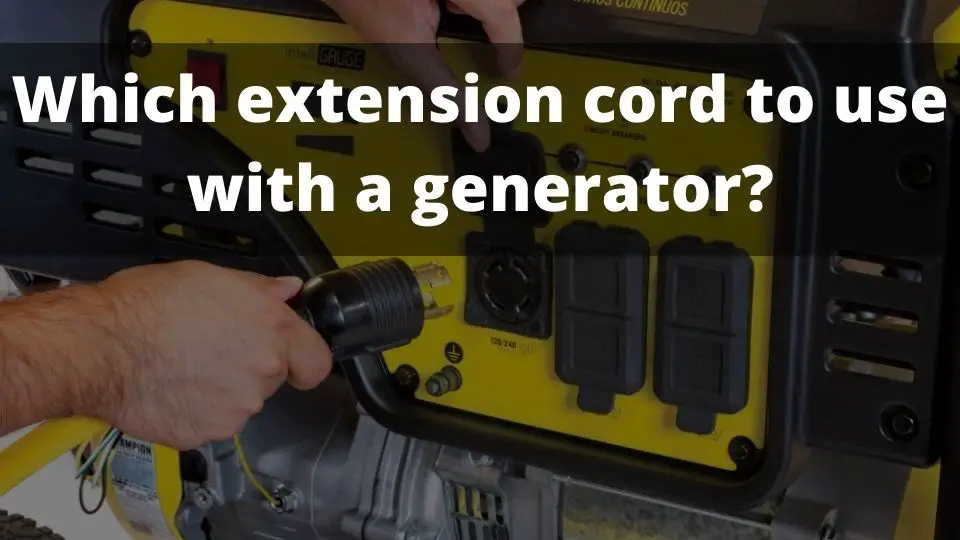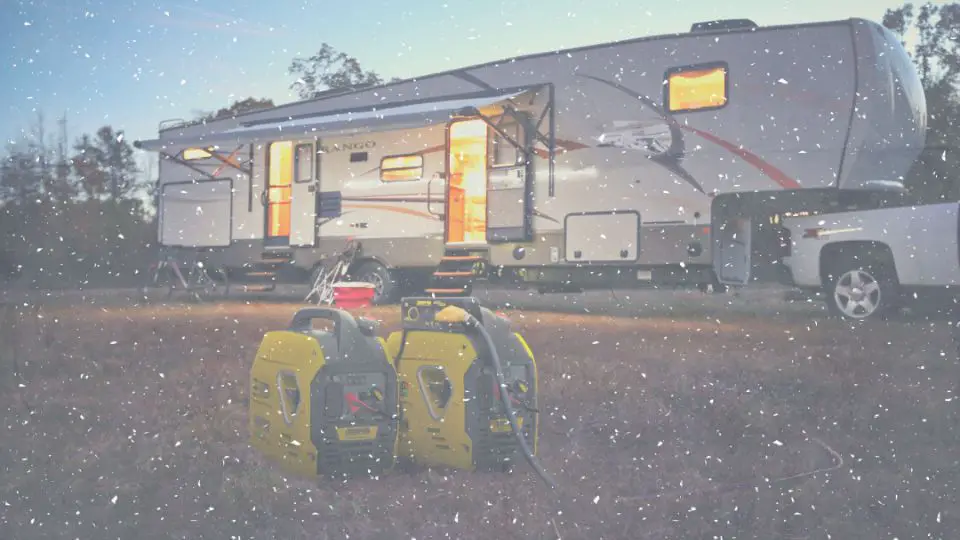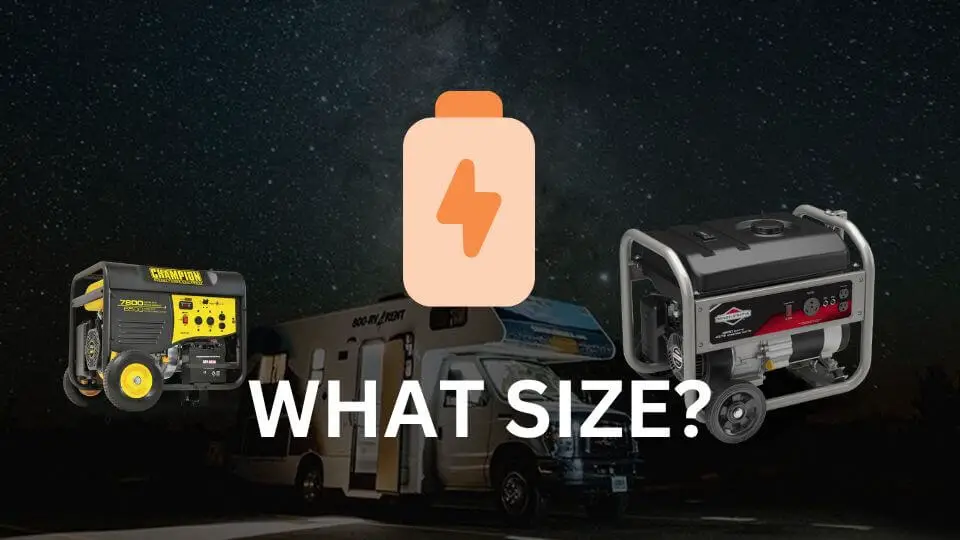This post may contain affiliate links. As an affiliate, we earn from qualifying purchases. We get commissions for purchases made through links in this post.
When it comes to powering your electrical devices with a portable generator, the importance of selecting the right extension cord cannot be overstated. Utilizing a proper extension cord is not only a matter of convenience but also a crucial element for the safety and efficiency of your power setup. While you may already have standard indoor extension cords at home, they may fall short of meeting the specific requirements of a portable generator.
In this comprehensive guide, we delve into the intricacies of choosing the ideal extension cord for your generator. We explore the various types available in the market, shedding light on the factors that determine their suitability for different applications. Understanding the load of your electrical devices and the amperage of your generator’s outlet is paramount, as it dictates the type of extension cord needed to withstand the power demand without risking overheating.
Embarking on a journey through the nuanced world of extension cords, we provide valuable insights into the practical aspects of using a portable generator in tandem with the right cord. From the correct procedures to ensure safety to the recommended lengths for optimal performance, this article equips you with the knowledge needed to make informed decisions for a seamless and secure power supply. Join us as we unravel the intricacies of extension cords, empowering you to harness the full potential of your portable generator.
What gauge of extension cord should you use with a generator?
Choosing the right gauge of extension cord for your generator is crucial to ensure both efficiency and safety in your power setup. A 12-gauge extension cord serves as the minimum size suitable for smaller loads, handling up to 15 amps. However, for larger loads or extended cord lengths, a more robust 10-gauge extension cord is imperative, provided it does not exceed 50 feet. The selection of an appropriate extension cord gauge is paramount, as an inadequately sized or lengthy cord may struggle to accommodate high loads, increasing the risk of overheating and potentially leading to a fire hazard.
To guide you in making an a wise choice, here is a breakdown of extension cord gauges along with their corresponding rated wattage and amperage:
- 6-gauge extension cord: Supports up to 50 amps, with a maximum power capacity of 12,500 watts.
- 8-gauge extension cord: Handles up to 40 amps, capable of sustaining a maximum load of 10,000 watts.
- 10-gauge extension cord: Ideal for loads up to 20 amps, accommodating a maximum of 5,000 watts.
- 12-gauge extension cord: Suitable for up to 15 amps, with a maximum power capacity of 3,750 watts.
- 14-gauge extension cord: Designed for 10-15 amps (preferably shorter lengths), supporting a maximum of 2,500 watts.
- 16-gauge extension cord: Recommended for 10-amp loads, with a maximum capacity of 1,600 watts.
It’s essential to match the extension cord’s gauge with the specific requirements of your devices and generator to prevent potential hazards. For instance, a 16-gauge cord, while suitable for small appliances like TVs, hair dryers, computers, microwaves, or phone chargers, is not recommended for power tools. For the latter, a safer choice would be at least a 14-gauge extension cord. Choose wisely to ensure a reliable and secure power connection for your diverse electrical needs.
- 30 Amp Extension Cord for RV - This 30 amp power cord adds up to 50 feet from the power outlet to your RV, camper or electric vehicle. With NEMA...
- 30 Amp / 125 Volt / 3750 Watt - With multiple length options, this heavy-duty 30 amp RV cord has a capacity of 125 Volts and 3750 Watts, carried...
- TT-30R and TT-30P Plugs - Each end of this 30 amp power cord features a 3 prong plug with the NEMA TT-30 specification, fitted with ergonomic...
- Weather Resistant for Outdoor Use - Your RV or camper is your ticket to the world, whether you prefer roadtrips or expeditions into the...
- GI-EXT-TT30P-TT30R
Which extension cord should you use with a generator for an RV?
Selecting the right extension cord for your RV generator is pivotal to ensure a seamless and safe power connection during your travels. When preparing to use a generator with your RV, it’s imperative to invest in a suitable extension cord that meets the specific requirements of your setup. Opt for an extension cord with a minimum gauge of 12, ensuring its capability to handle the power demands without compromising safety. Additionally, the cord should not exceed 50 feet in length, as longer or thinner cords may struggle to manage high loads, leading to overheating concerns.
For optimal performance and reliability, the recommended extension cord for an RV is a 50 AMP 6-gauge cord. This robust cord is designed to handle the power needs of your RV efficiently, providing a secure and efficient power supply. Alternatively, you can explore specialized RV extension cords available on platforms like Amazon, offering convenience with features like a handle for easy unplugging when not in use. These modern RV cords are crafted to cater specifically to the unique requirements of RV power connections, ensuring a hassle-free experience on your adventures. Prioritize safety and efficiency by selecting the right extension cord, allowing you to enjoy a reliable power source for your RV without any compromises.
Can you use regular extension cords with a generator?
The compatibility of regular extension cords with a generator hinges on various factors, including the cord’s wattage capacity, the power demands of your appliances or tools, and the cord’s length. Typically, short regular extension cords are suitable for low-wattage electrical devices like TVs, mobile phone chargers, or lighting.
However, it’s crucial to exercise caution when using conventional extension cords with generators, especially for outdoor use. Many standard extension cords may be either too thin or too long to efficiently handle the power output of a generator, posing the risk of overheating and potential hazards. This concern becomes even more pronounced when powering an RV, which often requires a robust 50-amp electric source.
To ensure a safe and reliable power connection, consider using extension cords that are specifically designed for generator use or those with a sufficient gauge to accommodate the power demands of your devices. This proactive approach helps mitigate the risk of overheating and ensures that your generator operates smoothly with various appliances and tools, providing a secure power supply for your needs.
How long can a generator extension cord be?
Maintaining an extension cord within a specific length range is crucial for the efficient and safe operation of a generator. It is recommended that a generator extension cord should not exceed 50 feet in length. The rationale behind this limitation is rooted in the cord’s ability to handle high loads without succumbing to overheating.
Longer extension cords face increased resistance, which can lead to the generation of excess heat, posing potential safety hazards. By adhering to the 50-foot limit, you ensure that the extension cord is optimized for the power demands of your devices, minimizing the risk of overheating and safeguarding both the cord and your generator. Prioritize safety and efficiency by selecting an extension cord of appropriate length, allowing for a reliable and secure power connection in various settings.
How many watts can a 14 gauge extension cord handle?
A 14-gauge extension cord is generally suitable for handling loads up to 15 amps and can support a maximum wattage of around 1,875 watts. It’s essential to match the gauge of the extension cord with the specific power requirements of your devices and appliances to ensure safe and efficient operation. If you have higher wattage needs, especially for power-hungry appliances or tools, you may want to consider using a lower gauge (thicker) extension cord to accommodate the increased power demands. Always check the manufacturer’s guidelines and ratings for both the extension cord and the devices you intend to connect to ensure compatibility and safety.
Is a 12 gauge extension cord good for the generator?
Yes, a 12-gauge extension cord is the minimum size that you should use for the generator. If you have a larger load or need a longer extension cord, you will need a thicker extension cord (lower gauge number).
What gauge extension cord for the generator to the refrigerator?
Most home refrigerators require around 2,000 starting watts to be able to run. This means that your extension cord must be able to withstand at least 2,000 watts, or even better to have some extra capacity.
With that in mind, you will need at least a 14-gauge extension cord that is not too long to avoid overheating. Best, if you use a 12-gauge cord to safely use any kind of home refrigerator with a freezer.
How do you use a portable generator with an extension cord?
Using a portable generator with an extension cord is a practical way to distribute power to various devices and even your entire house. Here’s a step-by-step guide:
- Connect the Extension Cord to the Generator:
- Identify the appropriate outlet on your generator for the extension cord. Ensure it matches the amperage and voltage requirements of the cord.
- Plug one end of the extension cord into the designated outlet on the generator. If it’s a higher amperage cord (30 amps or more), you may be able to lock the plug in place to prevent accidental unplugging.
- Connect Devices to the Extension Cord:
- Plug your appliances, tools, or devices into the other end of the extension cord. Ensure that the combined wattage of the connected devices does not exceed the generator’s capacity.
- Powering Your Entire House (Optional):
- If you want to power your entire house, use an inlet box installed outside. Connect the generator to the inlet box with a suitable cord, and then use individual extension cords inside the house to connect to various appliances.
- Consider Weather Conditions:
- While the extension cord itself may be waterproof, the generator is not. Protect your generator from rain and adverse weather conditions by placing it in a sheltered location. This is especially important when the extension cord is connected.
- Choose the Right Extension Cord:
- Depending on your usage and weather conditions, invest in a quality extension cord. Higher amperage cords and those designed for adverse weather conditions can provide better performance and durability.
Remember to always follow safety guidelines and manufacturer instructions for both the generator and the extension cord. Taking these precautions ensures a secure and efficient power distribution setup for your portable generator.

What are recommended extension cords for generators?
Some extension cords that are recommended for generators include:
- TOOLIOM 30A 125/250V 7500W – A 25 feet all-weather extension cord with Nema L14-30 locking connection
SaleTOOLIOM 30 Amp Generator Cord, L14-30P/L14-30R Generator Extension Cord, UL Listed Heavy Duty...- 【𝐂𝐞𝐫𝐭𝐢𝐟𝐢𝐜𝐚𝐭𝐢𝐨𝐧 & 𝐃𝐞𝐭𝐚𝐢𝐥𝐬】UL Listed NEMA L14-30P/L14-30R SJTW 10AWG/4C 30 Amp...
- 【𝐓𝐰𝐢𝐬𝐭 𝐋𝐨𝐜𝐤 𝐃𝐞𝐬𝐢𝐠𝐧】TOOLIOM 30 amp extension cord has a pair of torsion lock NEMA L14-30P/L14-30R...
- 【𝐋𝐄𝐃 𝐏𝐨𝐰𝐞𝐫 𝐈𝐧𝐝𝐢𝐜𝐚𝐭𝐨𝐫】There are power indicators on the the L14-30 generator cord. The...
- 【𝐏𝐞𝐫𝐟𝐞𝐜𝐭 𝐂𝐚𝐛𝐥𝐞 𝐒𝐭𝐨𝐫𝐚𝐠𝐞】Our 30 amp rv extension cord comes with a cable organizer, to...
- 【𝐇𝐞𝐚𝐯𝐲 𝐃𝐮𝐭𝐲 & 𝐑𝐞𝐥𝐢𝐚𝐛𝐥𝐞】This generator power cord is protected with high quality PVC jacket...
- RVINGPRO 50 Amp Generator Power Cord and Power Inlet Box – A 50 amps and 12,500 watts kit that includes an extension cord and an inlet box that you can install to power up your entire house. Sturdy and waterproof design.
RVINGPRO 50 Amp Generator Cord 50FT and Power Inlet Box, Pre-Drilled 50 Amp Generator Inlet Box with...- 50 Amp Generator Cord: NEMA 14-50P to SS2-50R 25FT heavy duty STW power cord with organizer bag, very convenient for storage the cord after using
- 50 Amp Power Inlet Box: NEMA SS2-50P generator inlet box, NEMA SS2-50P 125/250 Volt, Weatherproof for Outdoor Use.
- User-friendly Plug Design: The ergonomic finger grip design makes it easier for you to plug and unplug the male plug
- Safe Twist Lock Design: The twist locking ring design keeps dust and rain out of plug connection, making it safer during using
- Power indicator Design: A nice addition of indicator light on the cap of inlet box, it's easy for you to tell when the power is on.
- Watt’s Wire 15-ft 12 gauge 3-outlet lighted indoor/outdoor extension cord – Lightweight and cheap extension cord that can withstand up to 15 amps of load with a maximum of 1875 watts. This does not fit heavy power tools or a big refrigerator, but, would work well to power up TVs, electronics, and small appliances.
15 ft - 12 Gauge Heavy Duty Extension Cord - 3 Outlet Lighted SJTW - Indoor/Outdoor Extension_Cord...- 12 Gauge Extension Cord by Watt's Wire: Designed to safely handle up to 15 amps, this 15 amp extension cord is perfect for high-powered tools and...
- Outdoor Extension Cord SJTW: Our heavy duty power cords are made with an SJTW jacket which is suitable to temperatures from -40°F to 130°F....
- Flexible & Heavy Duty: Our cords use 12-Gauge soft-drawn copper to give 120V 15-amps with minimal voltage drop providing all the power you...
- Strong & Reliable: Crafted as an outdoor extension cord, our cords include strength-adding poly strands to make them handle heavy day-after-day...
- Safety: Designed to OSHA and UL 817 requirements, our outdoor extension cord is corrosion, fire, & moisture resistant; with built-in...
- RVGUARD 50 Amp 50 Feet RV Power Extension Cord – Great choice of an extension cord that can power up your RV. It has a convenient grip that allows you to easily plug and unplug it. Made of sturdy material that is hard to break. Allows you to power up a load of up to 50 amps and 12,500 Watts (with 250V). It is a 6-gauge cord with a locking plug on both ends.
RVGUARD 50 Amp 50 Foot RV Power Cord, 14-50P to SS2-50R Generator Extension Cord, Heavy Duty STW...- Electrical Rating: 50 amp RV power cord, with 50A male (NEMA 14-50P) & 50A female (NEMA SS2-50R) locking connectors, rated for 6250 Watt (125V)...
- Superior Durability: constructed from durable and weather resistant 6/3+8/1 Gauge STW jacket. ETL/cETL approved.
- Disconnect Handle: Easier to plug in and plug out without damaging the cable, and it keeps your fingers away from the power source to avoid...
- Easy to Organize: Come with a storage bag and plastic strap to make the cord neat when not in use. Easy to store in your RV or garage.
- Safe Construction: There is a threaded ring on the locking connector for regulating and waterproofing.
- Check out these best extension cords for different usage scenarios and environments









2 thoughts on “What kind of extension cord should I use with a generator?”
Comments are closed.